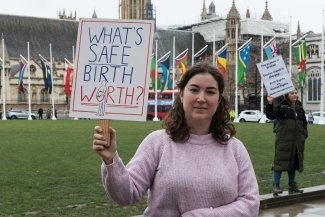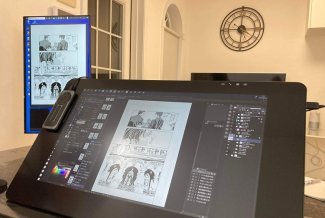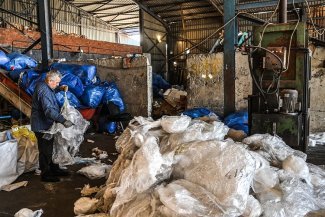Lecia Brooks is the outreach director at the Southern Poverty Law Center, where she travels across the US and abroad to counter hate and extremism and promote the celebration of difference.
The Southern Poverty Law Center (SPLC), which started out as a private law firm in the 1970s, played an instrumental role in ensuring that desegregation laws were actually enforced in the Deep South by suing local states. Half a century after the adoption of the landmark Civil Rights Act, the Alamaba-based legal advocacy organisation is now warning that the Trump administration’ dismantling of policies instated under his predecessor is an “assault on civil rights”.
Equal Times spoke to outreach director Lecia Brooks this summer at the European Women’s Lobby Women’s Forum about the mounting pressure on civil rights protections in the United States, the rise of populism on both sides of the Atlantic and the ripple effects of President Trump’s anti-immigrant rhetoric.
What forces in your view are driving the recent populist surge on both sides of the Atlantic? What makes politicians like Trump, but also Viktor Orbán in Hungary and Sebastian Kurz in Austria resonate with people?
First, it’s a response to growing multiculturalism and diversity. People are crossing borders in ways they never have before, and that is pushing and inspiring populism. These people [who vote populist leaders into office] feel like nobody cares about them. When it’s not really that – you had everything, you were the majority and now you’re becoming the minority. And so you have feelings about that, which I understand.
But I’m hopeful because the demographic shifts are already at play. If you look at the US population that is 55 and over, it’s still 75 per cent white, but for under-18s, it’s pretty much a 50-50 split between people of colour and white people. So, we’re in this growing pains moment and I think we’ll be OK. It’s just going to get really ugly [first] and I would like our political leaders to step up and make it not as ugly. Ultimately, white supremacists can’t win because they don’t have the numbers in terms of the population. They know that the shift is happening; this is their last gap of hope.
But the rise of populism isn’t just that. It also a response to the culture wars around marriage quality, and equality and acceptance of transgender individuals. Because that’s something these movements use too, they try to appeal to people who don’t want to be sensitive to or think about these issues. They want to go back to a time when it was simple – just ‘men’ and ‘women’, ‘husband’ and ‘wife’. And especially in countries in the European Union that were strongly Christian or Catholic, it’s harder to let go and it’s easier to go with a nativist like Trump.
Another oft-heard argument is that populist leaders tapped into fierce socioeconomic anxiety among white voters and concerns around globalisation that have for too long not been addressed.
Look, poverty is real, underemployment is real, the disenfranchisement of certain communities is real. So, let’s look at what the issues are around systemic racism, around poverty, around educational attainment, etc. Let’s look at that writ large for everyone and figure out how we’re going to do it. I say this for [Americans] because that’s who we’ve always said we are. The same counsel doesn’t apply to Europe because [they’re] coming out of something totally different.
What do you mean?
We [Americans] are this experiment in democracy, in bringing people together. We’ve been working on improving democracy since we created it and so we’ve always been people that came from different cultural backgrounds, and not traditionally nationalistic like Europe because you had something. Whereas with the exception of Native Americans, everyone came to the US.
The SPLC has warned that the current US government is strategically rolling back “hard-won civil rights protections”. What are the tell-tale signs that civil rights are under pressure in the US?
There are multiple examples, but a big one would be the rescinding of DACA [Deferred Action for Childhood Arrivals] status to young people who were brought to the country as children. Obama set up this policy, which Trump has now rescinded. So, all those young people are now subject to deportation.
Trump has also commissioned a voter fraud panel and tried to push the false narrative that there was voter fraud in the 2016 presidential elections. Whereas everybody who’s done research on voter activity would tell you there’s no issue with voter fraud; the real issue is voter suppression. He’s also trying to roll back protections for transgender kids in schools; you see this with these so-called ‘bathroom bills’. You also have someone like US Secretary of Housing and Urban Development Ben Carson who is moving to prevent people with criminal records from utilising public housing.
How has President Trump’s anti-immigrant rhetoric influenced the day-to-day realities of immigrants in the US?
By referring to Mexican immigrants as ‘rapists’ and Central American gang members as ‘animals’, Trump is dehumanising a group of people. When rhetoric targets a particular segment of the population like that – whether Muslims or immigrants – there will be an increase in hate, bias or attacks against that group and that’s we’re seeing.
His rhetoric has emboldened people to act out and say whatever they want. The SPLC has a web portal where we ask people to report incidents of bias or hate. There was an uptick in the immediate aftermath of the election because people got all excited that he won. People were going around the country, harassing immigrants and Muslims and telling them: “Trump won and you’re getting kicked out!” This happened in primary and secondary education classrooms, colleges, universities and workplaces – everywhere. We’d never seen this before.
During the 1970s, the SPLC successfully pursued a legal activism strategy to enforce desegregation laws thought the courts. What do you think the value is of a present-day protest movement like Black Lives Matter?
The significance of Black Lives Matter is that they have brought attention to the issue of police violence and racial profiling. I don’t think we would be in the position we are in today in terms of people documenting all kinds of racial profiling, or implicit bias like we saw at Starbucks [editor’s note: an employee called the police on two black men at a Starbucks café who were waiting for a friend]. So Black Lives Matter has done a lot in terms of shifting responsibility and pointing out white people have to do something to. There’s for instance, SURJ, short for Showing Up for Racial Justice, a white group that talks about issues of systemic racism amongst themselves and what can be done to dismantle the system – not out of place of guilt but out of a real understanding of systemic oppression. So that to me is very encouraging, and there would be no SURJ if there was no Black Lives Matter.
What are you most concerned about at the end of the day?
I feel really bad about the immigration thing. The way people are tricking each other and turning each other in – I don’t know what else to call it but Gestapo tactics. It’s unconscionable the way we are treating people. Children being separated from their parents, it’s heartbreaking. And we’re complicit. We invited people into our community by giving them a low-wage job, hiring them to be our nanny, and then we trick them and turn them in. That’s what really bothers me. And it’s all happening in our names. I could say it’s [Attorney General] Jeff Sessions or Trump but, really, it’s us because we’re not doing anything to change it.










